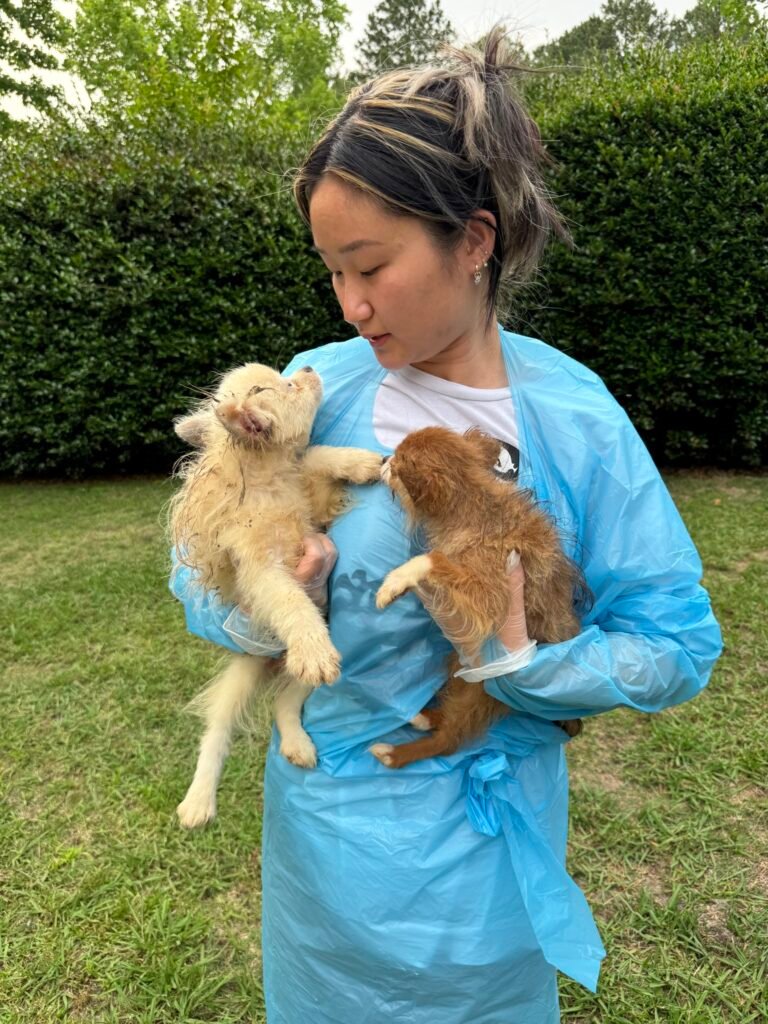It looked like any ordinary house in a quiet Wake County neighborhood—but behind closed doors, a disturbing reality unfolded. On June 4, the SPCA of Wake County and Raleigh Animal Control discovered 101 dogs living in appalling, unsafe conditions in what they now describe as a large-scale puppy mill operation.
The call came in after a tip about mistreated chickens on the property. But when officers stepped inside the house, they quickly realized the birds were only the beginning. The home, which seemed unremarkable from the outside, concealed rooms stacked floor to ceiling with cages. Inside, dogs were jammed together—five or six per cage—many caked in waste, trembling, and severely matted.
“We found cages stacked five and six high, some packed with multiple dogs,” the SPCA of Wake County posted. “Others wandered tight hallways, navigating waste-covered floors.”
The scene was described by responders as chaotic, dark, and heartbreaking.
Crammed, Dirty, and Forgotten

The dogs had likely been bred continuously for profit, with little to no regard for their wellbeing. Many were popular designer breeds such as goldendoodles and toy poodles, while others were Pomeranians, Yorkies, Chihuahuas, and one golden retriever found locked in a cage at the back of the house. Nearby, a litter of golden doodle puppies was also discovered confined in similar conditions.
“Some of these dogs had never felt the outdoors. They’ve likely lived their entire lives in wire cages,” said Samantha Ranlet, spokesperson for the SPCA of Wake County, in an interview with CBS 17.
Rescue teams also found several pregnant dogs and mothers nursing newborns. There were no visible toys, blankets, or even clean bowls—just the smell of urine and feces soaked into the floors and walls.
According to the SPCA, most of the animals were underweight, dehydrated, and suffering from untreated skin and eye infections. Many had fur so matted that it pulled at their skin and limited their mobility.
A Race to Save Every Life

Realizing the scale of what they were dealing with, SPCA of Wake County partnered with multiple agencies to remove the animals safely. It took hours to gently extract each dog from the cages and carry them into the sunlight—many blinking in confusion, as if the brightness hurt their eyes.
Nineteen of the dogs were taken directly to the SPCA’s facility, where veterinary teams began the painstaking work of nursing them back to health. The remaining dogs were distributed among partner rescues, each one facing a long road to rehabilitation.
“We are working quickly to medically assess each dog and begin providing treatment,” the SPCA wrote. “These dogs have endured so much. They deserve a fresh start.”
For the first time in years—or perhaps ever—these animals were being touched with kindness, spoken to gently, and offered clean bedding, soft hands, and food they didn’t have to fight for.
Their First Taste of Freedom
On June 6, just two days after the rescue, the SPCA shared a moving update. The dogs were finally able to breathe fresh air, stretch their legs, and enjoy what volunteers dubbed “the spa day of their lives.”
Volunteers gave them warm baths, trimmed away painful mats, and slowly introduced them to human contact. Some pups remained wary, recoiling at sudden movements, while others leaned into their caretakers as if sensing that, finally, they were safe.
“These dogs are discovering what it means to be cared for,” said Ranlet. “Many are going into foster homes where they’ll continue to heal until they’re ready for adoption.”
It will be a gradual process. Behavioral rehabilitation is just as vital as medical treatment. Some dogs may need weeks or even months to build trust and recover from the trauma they’ve endured.
A Community Comes Together

In the days following the bust, the SPCA received an outpouring of support. Donations, volunteer offers, and messages flooded in from concerned animal lovers across the state and beyond.
“This rescue is a big undertaking, and we can’t do it without you,” the SPCA posted in thanks. “We’re deeply grateful to everyone who has donated or reached out.”
They emphasized that while this rescue effort is extraordinary in scale, it’s not isolated. Puppy mills—where dogs are bred for profit with minimal care—are still operating across the country, often hidden in plain sight.
Organizations like the SPCA rely heavily on public vigilance and donations to continue responding to these calls.
A Second Chance for 101 Souls
The 101 dogs rescued from the Wake County home are no longer hidden behind wire and waste. They are survivors, each taking their first steps toward healing, safety, and the chance to be part of a loving family. After years of neglect, they are finally receiving the care, compassion, and dignity every animal deserves.
Their journey from confinement to freedom stands as a powerful reminder of what’s possible when communities come together to speak up and act. Though the road to recovery will take time, these dogs are no longer suffering in silence—they’re learning to trust, to play, and to love. And for the first time, their future is filled with hope.






